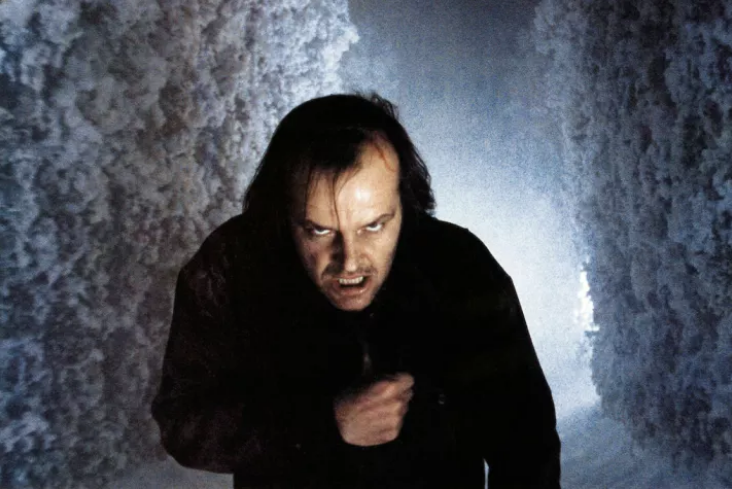Kind on film: Stanley Kubrick's 'The Shining' is a vision of Hell
Stanley Kubrick produced some of the greatest works of art ever committed to screen, but pandering to the audience's need to understand wasn't his first priority. The Shining defies classification in lots of ways. It's got ghosts, but it's not a ghost story because the ghosts might not be real. What really happens, precisely how and why is never definitively explained. Like all good art, it leaves room for interpretation.
So here's my take....

The Overlook hotel is Hell. It's a depository of souls, a place where tortured minds go to die – a lot like Scarborough. Now, it might seem obvious to say that the Overlook hotel is in some way possessed by evil, but I'm not just arguing that there is evil present at the hotel. I'm saying that, within a Christian understanding, the hotel plays out a sort of Satanic end-game.
Let's come at it from this angle...
Spiritually and scripturally, the enemy can only corrupt what is Good. Jesus said, 'my Father's house has many rooms'. The Overlook then is a corruption of that house – a place with (literally) many rooms, although in this case the Father who owns the rooms is the Father of Lies.
Deception always masquerades as something else. For Jack Torrance (Jack Nicholson) and his family, the vastness and grandness of the hotel is the baited hook used to divide them. The only time we see the family together as a functioning unit is in the car on the way over there: 'A cord of three strands is not easily broken' (Ecclesiastes 4:10). From the moment they arrive, the power of the hotel seeks to separate them one from another, isolate them and take them out.

As the film progresses, we witness each member of the family being absorbed into the fabric of the hotel (Danny travels on his trike in seemingly concentric circles; Wendy wears a cardigan that matches the curtains; Jack witnesses ever more elaborate manifestations of the past). By destroying community, relationships falter, isolation occurs and mental health suffers. None of the three family members witness the same apparitions within the hotel. They are separated by their contrasting experiences and lose their foundation.
Things really go south when Jack enters the bar and says he would sell his soul for a drink. It's almost as though at that point, he gets his wish. He's a writer, so he knows all writing is about wish-fulfilment: Lloyd, the sinister looking barman, appears and starts to engage with him. There's no charge for Jack to have a drink. The enemy offers death as freely as the Lord offers Grace. This all happens in the Gold Room – because that's what the enemy does, it glitzes up death to look like life.

Shortly after that, Wendy tells Jack that there's an old woman in Room 237 who tried to hurt Danny. Jack goes to investigate and sees a beautiful naked woman. It's only when he fully embraces this siren that he sees her for what she really is: a rotting old corpse. This is Jack's alcoholic addiction manifested. All that glistens isn't gold; 'The idols speak falsehood' as Zechariah 10 says. When Wendy asks Jack what he found in Room 237, he says he found nothing. He lies, he hides – and as a result he isolates himself from both the truth and from Wendy's experience of reality.
That's what the enemy does: he promises something he has no intention of delivering. Satan is not the Father of negative emotions, he's the Father of lies and he lies to us that our soul is worth selling for a drink; that death is life; that separation is freedom.
The Shining shows the power of disconnection and takes it to its logical conclusion. The enemy in this film seeks to tear people apart from their loved ones and then devour them. The lengths it will go to in order to isolate is arresting. Once ensnared by the lie it prevents them from seeking help; Jack is told by Grady the waiter (in one of the most atmospheric movie scenes of all time) that he needs to correct his son for getting outside help. It's in this scene that we meet the ancient evil at work.
'You've always been the caretaker. I should know, sir – I've always been here.' The voice of the accuser mimics the voice of the Father when he says, 'I know who you are.' He tries to trap us in a false identity we weren't made for.
The redemption within The Shining comes as Jack's son Danny recognises the power of the hotel and escapes with his mum. The young man escapes because someone (Scatman Crothers' Halloran) helps him see he has an identity beyond his family lineage – the unconditional love of a parent (mother) and giftings to operate in. During the final chase scene through a snow-covered maze, Danny walks back through his own tracks, which confuses Jack (but stylistically suggests that Danny won't continue walking the path his father went down.) Jack stops chasing Danny when he sees that the footprints in the snow have stopped and there is just unblemished snow. 'Though your sins are like scarlet, they shall be as white as snow' (Isaiah 1:18).
The Shining is a fictional story about a real situation: that people are trapped within their own existence, with a power at work seeking to reduce them to nothing; to annihilate them. The Bible refers to hell as outer darkness. That's where Jack is finally consumed – outside in the dark.
People are isolated and lonely, and addicted and depressed. We need to speak true identity over them: that they are loved and are invited to become children of God, adopted into a new family where generational hurt and sin doesn't get to win; where they are no longer slaves, but sons and daughters. Sharing the Good News is just the process of replacing the lies people have been told with the truth about who they were born to be. It's always a trade with Jesus. A garment of praise for a spirit of despair; abundance in place of stolen identity; his death for your life.
There's also a real thing called Freedom. And the offer is open to all. Nobody is Overlooked.
Andy Kind is a comedian, preacher and writer. You can abuse him on Twitter @andykindcomedy. Or even better, book him to come to your town so others can abuse him in person. His book, 'The Unfortunate Adventures of Tom Hillingthwaite', is available here.











